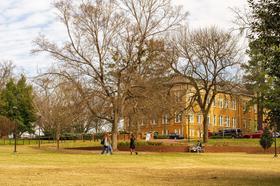Serving 1,218 students in grades Prekindergarten-5, Mirror Lakes Elementary School ranks in the bottom 50% of all schools in Florida for overall test scores (math proficiency is top 50%, and reading proficiency is top 50%).
The percentage of students achieving proficiency in math is 52% (which is equal to the Florida state average of 52%). The percentage of students achieving proficiency in reading/language arts is 44% (which is lower than the Florida state average of 52%).
The student-teacher ratio of 18:1 is higher than the Florida state level of 17:1.
Minority enrollment is 85% of the student body (majority Hispanic), which is higher than the Florida state average of 65% (majority Hispanic).
Quick Facts (2026)
- Grades: Prekindergarten-5
- Enrollment: 1,218 students
- Student-Teacher Ratio: 18:1
- Minority Enrollment: 85%
- Overall Testing Rank: Bottom 50% in FL
- Math Proficiency: 52% (Top 50%)
- Reading Proficiency: 44% (Btm 50%)
- Science Proficiency: 45% (Btm 50%)
- Source: National Center for Education Statistics (NCES), FL Dept. of Education
School Overview
Mirror Lakes Elementary School's student population of 1,218 students has grown by 20% over five school years.
The teacher population of 66 teachers has grown by 6% over five school years.
Grades Offered
Grades Prekindergarten-5
(No virtual instruction)
(No virtual instruction)
Total Students
1,218 students
Gender %
Total Classroom Teachers
66 teachers
School Rankings
Mirror Lakes Elementary School ranks within the bottom 50% of all 3,662 schools in Florida (based off of combined math and reading proficiency testing data).
The diversity score of Mirror Lakes Elementary School is 0.54, which is less than the diversity score at state average of 0.70. The school's diversity has stayed relatively flat over five school years.
Overall Testing Rank
#1966 out of 3662 schools
(Bottom 50%)
(Bottom 50%)
Math Test Scores (% Proficient)
52%
52%
Reading/Language Arts Test Scores (% Proficient)
44%
52%
Science Test Scores (% Proficient)
45%
52%
Student-Teacher Ratio
18:1
17:1
American Indian
n/a
n/a
Asian
1%
3%
Hispanic
64%
37%
Black
17%
21%
White
15%
35%
Hawaiian
n/a
n/a
Two or more races
3%
4%
All Ethnic Groups
Participates in the National School Lunch Program (NSLP)
Yes
Eligible for Free Lunch
75%
47%
Eligible for Reduced Lunch (19-20)
3%
6%
School Statewide Testing
School District Name
Source: National Center for Education Statistics (NCES), FL Dept. of Education
Profile last updated: 02/09/2025
Frequently Asked Questions
What is Mirror Lakes Elementary School's ranking?
Mirror Lakes Elementary School is ranked #1966 out of 3,662 schools, which ranks it among the bottom 50% of public schools in Florida.
What schools are Mirror Lakes Elementary School often compared to?
Mirror Lakes Elementary Schoolis often viewed alongside schools like Lehigh Elementary School, Veterans Park Academy For The Arts, G. Weaver Hipps Elementary School by visitors of our site.
What percent of students have achieved state testing proficiency in math and reading?
52% of students have achieved math proficiency (compared to the 52% FL state average), while 44% of students have achieved reading proficiency (compared to the 52% FL state average).
How many students attend Mirror Lakes Elementary School?
1,218 students attend Mirror Lakes Elementary School.
What is the racial composition of the student body?
64% of Mirror Lakes Elementary School students are Hispanic, 17% of students are Black, 15% of students are White, 3% of students are Two or more races, and 1% of students are Asian.
What is the student-teacher ratio of Mirror Lakes Elementary School?
Mirror Lakes Elementary School has a student ration of 18:1, which is higher than the Florida state average of 17:1.
What grades does Mirror Lakes Elementary School offer ?
Mirror Lakes Elementary School offers enrollment in grades Prekindergarten-5 (No virtual instruction).
What school district is Mirror Lakes Elementary School part of?
Mirror Lakes Elementary School is part of Lee School District.
In what neighborhood is Mirror Lakes Elementary School located?
Mirror Lakes Elementary School is located in the Eisenhower neighborhood of Lehigh Acres, FL. There are 3 other public schools located in Eisenhower.
School Calendar
View the Mirror Lakes Elementary School yearly calendar below. Note key dates such as:
Event
Date
Spring Break
March 16, 2026 (Monday)
Last Day for Students
June 01, 2026 (Monday)
School Reviews
Review Mirror Lakes Elementary School. Reviews should be a few sentences in length. Please include any comments on:
- Quality of academic programs, teachers, and facilities
- Availability of music, art, sports and other extracurricular activities
Recent Articles

Zero Tolerance Policies in Public Schools Today
An updated look at zero tolerance policies in public schools, including current trends, costs, legal concerns, and what parents need to know now.

The Pros and Cons of Tracking in Schools Today
Explore the advantages and drawbacks of academic tracking in today’s public schools, including equity, outcomes, and what parents should consider.

Budgeting Hidden Costs of Public Schooling in 2026
Learn how families budget for school lunch, after-school care, and activities, the hidden costs of public schooling in 2026.





